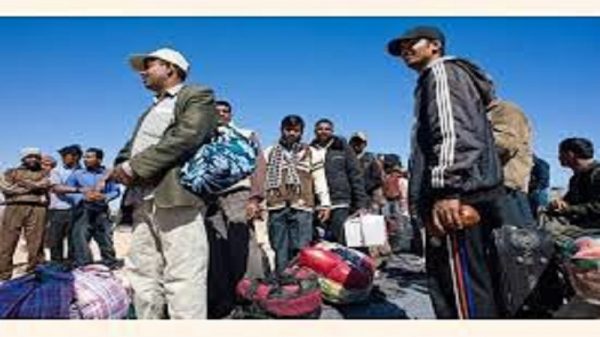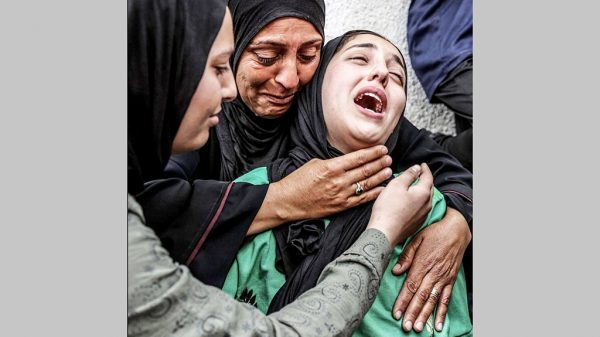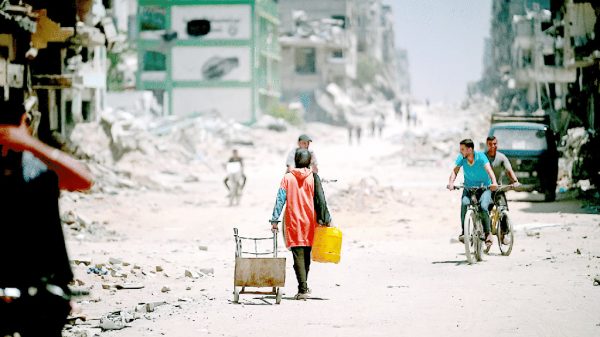Jumatul Wida, the last Friday of the holy month of Ramadan, will be observed across the country on Friday with due religious solemnity and reverence. Thousands of Muslim devotees will attend the Juma prayers at different mosques, seeking divine blessings for peace and progress of Bangladesh and unity of the Muslim Ummah. The day’s biggest congregation will be held at Baitul Mukarram National Mosque in the capital. Khateebs and ulemas will deliver sermons, highlighting the significance of Jumatul Wida. Muslim devotees will offer prayer at Baitul Mukarram today maintaining physical distance as per the government directives to stay safe from coronavirus infection. Bangladesh reported its first coronavirus cases on March 8 and the first death on March 18. As the number of cases increased, the government restricted offering prayers at mosques. After about a month, the government lifted the restrictions on condition that safe distance and proper hygiene have to be maintained while offering prayers at mosques.

As estimated, amid slump with a loss of about $6 billion in export earnings primarily through RMG, the next big shock for the economy of Bangladesh will be its remittance inflow, which is considered as the life-line for many rural families. The Bangladesh Bank recent data on March 2020 Remittance Inflow, shows a clear significant downturn. It is 11.83% less than the March 2019. We are already informed that many of our workers in different countries have started losing their jobs, and more people will lose their jobs in the coming months. Along with the documented labours, there are also a large number of undocumented labourers in Europe and other regions, which will be severely impacted due to COVID-19 pandemic. The most affected industry of this crisis would be the service sector of those countries, where Bangladeshi migrant workers are mostly engaged.
It is important to mention that remittance, as a tangible outcome of overseas employment, has positioned it as the second-highest foreign exchange earning source (around 40%) after the garments sector in Bangladesh. The remittance inflow hits a record $18.32 billion in the just concluded year of 2019 amid devaluation of the taka and the government move to provide incentives against remittance and it grew by 17.89 per cent against $15.54 billion in 2018 (Bangladesh Bank, 2020). It makes up around 6-8% of the country’s GDP, and renders a sizable contribution to national income, macroeconomic stability and poverty reduction. Data shows that at least around one-third of the country’s new labour force take overseas employment each year- which has become a ‘safety valve’ for millions of Bangladeshi migrant workers and their families.
According to BMET, around 60,000 Bangladeshis go abroad for occupation every month. So, if the COVID-19 pandemic lingers, queues of those waiting to join overseas will grow further. Also there is no guarantee that all these migrants who returned in the last three months, can go back to their respective countries or not. According to BAIRA, about 1.5-2 lakh migrant workers had completed the process for overseas jobs in the last three months and were waiting to leave the country. Not only this, the COVID-19 crisis in the wealthier economies will also restrict our future job markets. According IOM COVID-19 Response (Issue Brief, 8 May, 2020) “with migrant workers highly concentrated in occupations and sectors expected to be particularly hard hit by the economic consequences of the COVID-19 Crisis, inevitably, remittances will also take a hit”, while the World Bank projects a global decline of 20% in remittances sent to lower and middle income countries in 2020, representing USD 109 billion (Migration and Development Brief32, the World Bank, April 2020). The situation will be more vulnerable for those countries which particularly dependent on remittances. Remittances represent over 10% of GDP for 30 countries in the world, and over 5% of GDP for an additional 27 countries. Smaller countries with high levels of emigration are particularly vulnerable, with remittances accounting for, for example, 30% and 20% of GDP in Nepal and El Salvador respectively. The World Bank report further stated that the countries and communities including Bangladesh that reliant on labour migration and remittances will in fact see a double impact from this crisis as, in addition to declining remittances, these communities will need to absorb an increasing number of returning labour migrants, unable to find work in countries of destination.
Overseas Migration and Contribution to Economy
For the last few decades, overseas migration has been the cornerstone of our economy and society. More than 10 million Bangladeshi nationals have so far migrated overseas for employment and dispersed themselves across 160 countries covering all the major continents and regions. Migration plays a pivotal role in the economy of Bangladesh in two major ways: firstly it reduces unemployment and secondly, migration greatly affects the remittance inflows. Data shows that with some periodical downswings, remittance inflow has increased every year. Our overseas employment represents over one-fifth of our annual addition to the country’s total labour force and over half of additional manufacturing jobs created in the recent years. Migration has a very substantial contribution towards the achievement of Sustainable Development Goals (SDGs) of 2030 in Bangladesh. Before the pandemic of COVID-19, it was estimated that overseas workers migration would increase by 1.5 times in the next decade as it was almost 1 million a year for the last few years. But now the situation will be very much reversed. Bangladeshi-migrant heavy countries especially Italy, Spain, France, Germany and the UK, UAE, Saudi Arabia, Qatar, Dubai, Malaysia, Singapore have been hit badly by the pandemic. And the COVID-19 situation in the USA will definitely affect our labour markets and significantly reduce our remittance inflow.
Seeing Migrants through Anthropological Lens
Through my teaching and research on ‘Migration and Diaspora, I have established some relations with some Bangladeshi migrant workers across Asia, Middle East and Europe. Most of my contacts are either ‘semi-skilled or ‘unskilled’ migrants, working as restaurant and shop assistants, shop owners, cleaners, chefs, taxi drivers, salesmen/sales executives/managers, etc. These migrant workers mostly belong to the 25-50 age range and are living in different countries without their families. Some of my contact migrants don’t have legal immigration papers and have not visited home for 5-10 years. I have heard many stories of their deadly journey to their current destinations spending upwards of 15 lakh to wage through the toughest of routes to find occupation abroad. I know, some of them have put their applications for legal status and are waiting for their papers, while others are engaged in secured jobs and businesses with legal immigration status and are able to visit home every 2-3 years. I’ve also been in contact with migrants who have come to Bangladesh in the last three months. A couple of these migrants underwent quarantine at the Ashkona camp, or were in quarantine and isolation in different districts across the country.
As an anthropologist, I have seen what a wide range of non-humanitarian and adverse behaviours shown to our returned migrants by their family members, community people, local administration and the medical service providers and at what level that has socially stigmatised and psychologically traumatised our ‘migrant workers’ (whom RMMRU termed as ‘Sonar Manush’), as if they are the sole transmitters of the virus of COVID-19 or bearer of the disease. Furthermore, we have observed how social media has blamed our migrant workers for bringing coronavirus to Bangladesh from abroad and has increased humiliation, physical assaults and bullying to the migrant workers across the country. Even in many places, the administration and other local social bodies have isolated and quarantined the migrants with a very harsh attitude and finally locked-down them in their houses by flying red flags instead of showing them respect, giving them medical supports and social protection. In some places, it has resulted in hiding of many migrants from their near and dear ones by avoiding testing, and getting mentally depressed.
Protection of Migrants
In the last few weeks, we have seen much hue and cry from our garment sector upon having the shock of COVID-19 in terms of cancellation of existing orders, expecting less order in the future, loss in jobs of about 2 million workers and others. According to the BGMEA, Bangladesh earned more than $34 billion in 2018-19, of which $22 billion worth of Garments were exported to the US, the UK, Spain, France, Italy and Germany. Seeing the crisis of our export sector, the government has declared a large fund (tk.77, 750 crore) to bailout and special focus has been given on the RMG sector, as it is one of the largest labour prone (mostly female) and foreign currency earning sectors. Like the garment sector, the government should also allocate a fund to give necessary protection to our more than 10 million overseas migrant workers who are always working hard to send back remittance and to strengthen our economy. According to BMET, Bangladesh receives almost one third of its remittance (more than $5 billion) from the above mentioned six countries, while the Middle East is home to almost half of our total migrant workers and provides the highest amount of remittance. According to IOM, millions of migrant workers left the most affected countries such as the US, the UK, Italy, France, Germany, Spain, Singapore, Malaysia, UAE and Saudi Arabia, when the lockdown was announced and many more will return once normalcy comes again. Experts say that Bangladesh will be one of the most affected countries among all the top-remittance receiving countries due to the severe effects of COVID-19 in migrants’ working countries.
Actions for ‘Bailing Out’
As an immediate action, our embassies in all the countries should collect information about our affected migrants, so that they can be supported in various ways. They should provide food, accommodation and medicine to the affected (both documented and undocumented) ones. Necessary support should be given to the families of those migrants, who are dying in different countries. The government should immediately establish contact with our workers and ensure all the necessary support for them to keep them safe. Vulnerable families, who depend on migrants earning, should be identified and given necessary social protection. To bailout from this crisis:
• Government should be in touch with the governments of all the migrant labour prone countries to continue the recruitment as part of their help and as a symbol of solidarity. Government should also bargain with the respective countries to take back our stranded workers, and in any adverse situation, request for compensation.
• More attention has to be given to create new job markets in comparatively less affected countries considering their bailout strategies and GDP growth and also try to understand what type of new skills will be more required in the post-COVID situation in the most affected migrant prone countries.
• We need to work out a strategy in consultation with our experts from different government and non-government agencies and institutions to cope with the present fragile overseas labour markets especially considering our competitors such as India, Pakistan, Indonesia, Philippines, Sri Lanka, Thailand, China, Nepal and others and need to explore some new skills that will be required in the post COVID-19 situation such as doctor, medical assistant, nurse, home health-caregivers, micro-biologist, community health worker and others; and
• Most importantly, government should immediately take step to develop an inclusive, equitable and people-centred sustainable action plan to socially and economically (by giving easy access to loan and other necessary financial benefits and supports to become an entrepreneur or by creating opportunity for employment looking at the their skills/experience gathered overseas) reintegrate our returned migrants as well to stimulate the process of re-migration to the countries based on the country-specific new requirements with further necessary up-skilling, re-skilling and other skill development trainings.
Finally, I would like to say that knowing about the impact of COVID-19 on our garment sector, we have already raised our voice but now we need to raise our voice to protect our migrants. We should give equal attention to our RMG and Remittance (2R) to save our economy. Both of these two labour-prone sectors are the life-lines for our economy, especially the rural household economy. More than 10 million migrant workers are the bread earners of another 10 million families. Both returned migrants and the migrants abroad are now the serious victims of COVID-19. They will have to face more challenges even after the withdrawal of lockdown and resuming of flights in the most affected migrant prone countries. More migrants will have to come back due to loss of jobs. Therefore, an immediate action plan considering the allocation of enough funding is the very least our ‘sonar manush’ deserves.
The writer is a Professor of Anthropology at Dhaka University. He can be reached at: saifur@du.ac.bd.




























Leave a Reply